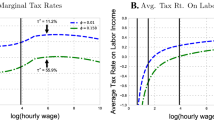Abstract
This study is an investigation of the effect of profit-sharing on labor productivity. When monitoring labor performance is costly for management, a regular wage/salary contract is insufficient to induce profit-maximizing behavior from the worker. The authors demonstrate that when this profit-maximizing behavior can be induced only through profit-sharing, a linear profit-sharing program will increase productivity and the welfare of both management and labor. The benefit from profit-sharing is increasing up to the point where the utility of additional income is offset by the negative utility of extraordinary effort (working harder or providing higher quality work). The income effect, i.e., the change in negative utility of extraordinary effort given a change in income, can potentially either increase or decrease the point at which the income-effort tradeoff-reaches zero.
Similar content being viewed by others
References
Alchian, Armen A.. “Specificity, Specialization, and Coalitions.”Zeitschrift fur die gesamte Staatswissenschaft (Zgs) 140 (1984): 34–39.
Alchian, Armen A., andHarold Demsetz. “Production, Information Costs, and Economics Organization.”American Economics Review 62 (1972): 77–95.
Cable, John, andFelix R. FitzRoy. “Productivity Efficiency Incentives and Employee Participation.”Kyklos 33 (1980): 100–121.
Defourney, Jacques, Saul Estrin, andDerek Jones. “The Effect of Workers’ Participation on Enterprise Performance.”International Journal of Industrial Organization 3 (1985): 197–217.
FitzRoy, Felix R., andJohn Hiller. “Efficiency and Motivation in Productive Organization.” Berlin: International Institute of Management, Discussion Paper 78-15, 1978.
FitzRoy, Felix R., andJohn Hiller. “Cooperation, Productivity, and Profit Sharing.”Quarterly Journal of Economics 102 (1987): 23–35.
FitzRoy, Felix R., andKornelius Kraft. “Profitability and Profit-Sharing.”Journal of Industrial Economics 35 (1986): 113–130.
FitzRoy, Felix R., andDennis Mueller. “Cooperation and Conflict in Contractual Organization.”Quarterly Review of Economics and Business 24, no. 4 (Winter 1984): 23–49.
Holmstrom, Bengt. “Moral Hazard in Teams.”Bell Journal of Economics 13 (Autumn 1982): 324–340.
Jones, Derek, andJan Svejnar. “Participation, Profit-Sharing, Worker Ownership and Efficiency in Italian Producer Co-operatives.”Economica 52 (1985): 449–467.
MacDonald, Glenn M.. “New Directions in the Economic Theory of Agency.”Canadian Journal of Economics 17, no. 3 (1984): 415–440.
Samuelson, Paul A. “Thoughts on Profit-Sharing”.Zeitschrift fur die gesamte Staatswissenschaft (Zgs) (1977, Special Issue on Profit-Sharing): 9–18.
Weiztman, Martin, L. “The Simple Macroeconomics of Profit Sharing.”American Economic Review (December 1985): 937–953.
“Why Labor and Management Are Both Buying Profit Sharing.” Business Week, 10 January 1983, 59.
Author information
Authors and Affiliations
Rights and permissions
About this article
Cite this article
Chang, CH., Bjornstad, D.J. Profit, productivity, and profit-sharing. J Econ Finan 17, 103–114 (1993). https://doi.org/10.1007/BF02920086
Issue Date:
DOI: https://doi.org/10.1007/BF02920086




